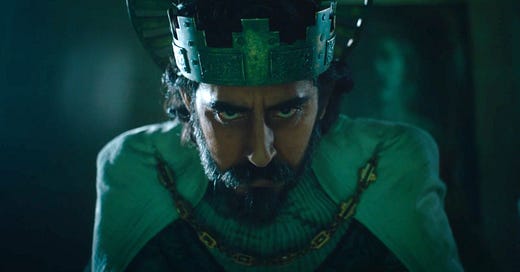The Green Knight
Moody, slow-moving and existential, "The Green Knight" is gorgeous but dense -- what you might get if Terrence Malick decided to make a Knights of the Round Table movie.
This review is part of our free content available to everyone. Please consider supporting Film Yap with a modest paid subscription to enjoy everything we publish plus exclusive opportunities.
If you're a buff of the Arthurian legends -- what, you mean every 9-year-old wasn't checking out "Le Morte d'Arthur" from the public library? -- the tale of Sir Gawain and the Green Knight is well known to you. It's a parable about bravery and honesty, as one of the most steadfast knights is faced with a strange challenge and finds himself lacking.
"The Green Knight" is far from what most people expect of a King Arthur movie. One of my all-time favorite films is "Excalibur," one of the first R-rated movies I ever got to see, and this movie from writer/director David Lowery is decidedly not that.
It's a moody, existential exercise that has very little action or traditional narrative. It's written and directed by David Lowery, who has made mainstream fare like "Pete's Dragon" but also "A Ghost Story" and "Ain't Them Bodies Saints," dreamy films that are almost experimental in their eschewing of usual forms of storytelling.
It's visually resplendent, dark, deliberately hard to decipher. You will occasionally have trouble understanding what people are saying or what is going on. It's not so much the kind of movie that you watch and enjoy as an experience that slowly absorbs into your skin.
Imagine if Terrence Malick made a Knights of the Round Table movie -- that's the best description I can give.
Dev Patel plays Gawain, who in this version is the nephew of King Arthur, young and not yet a knight. He mostly spends his days drinking and carousing in brothels, especially with Essel (Alicia Vikander), a headstrong prostitute who sees herself as destined to become his lady.
In this setting it is the latter days of the Round Table; Arthur (Sean Harris) and Guinevere (Kate Dickie) are elderly, as are most of the great knights, and they are enjoying the fruits of their long struggles on Christmas Day. Their revelry, including the apparent decision by Arthur to dub Gawain his heir, is interrupted when a strange knight dressed all in green invades their sanctum.
The Green Knight (Ralph Ineson) looks like he grew out of a tree, with a beard of roots and armor and skin that is more like bark than flesh and metal. He lays down a challenge: any knight may have a free blow at him; but if he survives the man mast travel north to his chapel to meet the Green Knight for a return strike one year hence.
Gawain eagerly accepts the challenge to prove his mettle, using Arthur's sword to behead the Green Knight. (In the poem, he uses the knight's own axe -- one of many ways, large and small, that Lowery departs from the mythology.) But the Green Knight's body simply picks up his head, reminds Gawain of their appointment, and departs.
Lowery divides each section of the story into chapters with titles such as "A Kindness" or similarly mysterious labels. Gawain suffers a number of adventures, or more accurately misfortunes, along the way. He is accosted by bandits (Barry Keoghan among them) and loses his horse. He wanders into an empty house and encounters the spirit of Winifred (Erin Kellyman), a young girl who has a task for him.
Things wind up, as the poem does, at the grand castle of a lord and lady (Joel Edgerton and Vikander again), who encourage Gawain to stay for a few days and rest, as the chapel is not far. During his time there Gawain is tempted in various ways, with the lord going out to hunt every day and bringing back his quarry as a gift, and the lady with more sensual entreaties.
But the fateful meeting with the Green Knight must come, and seems destined to be Gawain's end.
This is an amazing-looking movie. The cinematography by Andrew Droz Palermo just astounds -- there are many shots that you could pluck out any frame, enlarge and put it on a museum wall, and it would not look out of place. Gawain wears an ochre-colored cloak that becomes his totem, and is sometimes accompanied by a bright red fox who is companion and spirit guide.
A liked a lot of things about "The Green Knight." The total experience is more enervating than engrossing. The middle section in particular creeps almost to a halt.
Lowery sometimes seems like he's more interested in playing around with the conventions of narrative filmmaking than actually crafting something audiences will want to see. He'll use time slips to see into the future, then back them up and have things go in a different direction. I felt toyed with rather than intrigued.
This is surely what you'd call an art-house version of an Arthurian movie. I love the idea of a feature film that doesn't rest on the usual Arthur/Guinevere/Lancelot triad -- it's like getting a "Star Trek" movie all about Sulu. I do think this take will leave most mainstream audiences scratching their head.





